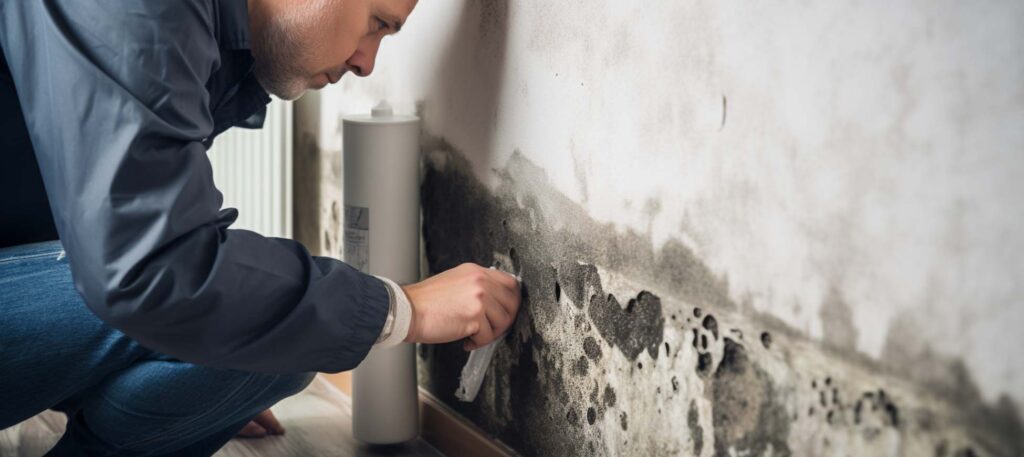What is Mold?

Mold is a persistent issue that plagues many homeowners in Atlanta. By inspecting mold we can understand the causes of mold growth is the key to preventing and addressing this unwelcome intruder. In this comprehensive guide, we’ll delve into the common triggers of mold growth and explore how Clymore Mold can help you combat these issues effectively.
Common Causes of Mold Growth in Atlanta, GA
1. Excessive Moisture
Excessive Moisture: Mold thrives in damp environments, and one of the primary causes of mold growth is excess moisture. This can result from various sources, including:
- Leaky Roofs: Roof leaks, often caused by damaged shingles or flashing, allow rainwater to infiltrate your home.
- Plumbing Leaks: Leaking pipes, faucets, or appliances can introduce moisture into walls and floors.
- Poor Ventilation: Inadequate ventilation can trap moisture indoors, particularly in areas like bathrooms, kitchens, and basements.
Atlanta-Specific Concern: Atlanta’s humid subtropical climate can exacerbate moisture-related mold issues. High humidity levels, especially during the summer, can lead to increased indoor moisture, providing an ideal breeding ground for mold.
2. Water Damage
Water Damage: Previous water damage, whether from leaks or flooding, can leave residual moisture that supports mold growth. Unaddressed water damage is a significant mold risk. Sources of water damage include:
- Flooding: Atlanta’s occasional heavy rainfall and risk of flooding can lead to water damage if proper precautions and maintenance are not taken.
- Water Leaks: Leaks from pipes, appliances, or roofing can introduce moisture into your home’s structure.
3. Poor Ventilation
Inadequate Ventilation: Proper ventilation is crucial in areas prone to moisture buildup, such as bathrooms, kitchens, and basements. Inadequate ventilation can trap humidity and contribute to mold growth.
- Bathrooms: Bathrooms without exhaust fans or windows for ventilation can become humid environments, particularly after showers.
- Kitchens: Cooking generates moisture, and without adequate ventilation, this moisture can linger and promote mold growth.
Atlanta-Specific Concern: Atlanta residents often rely on air conditioning to combat the heat. Improperly maintained HVAC systems can exacerbate indoor humidity issues, leading to mold problems.
4. Neglected Maintenance
Neglected Maintenance: Failure to address water leaks, roof issues, or plumbing problems promptly can contribute to mold growth. Regular home maintenance is essential. Neglected maintenance includes:
- Roofing: A poorly maintained roof can develop leaks, allowing moisture to enter your home.
- Plumbing: Leaking pipes or fixtures should be repaired promptly to prevent moisture accumulation.
Atlanta-Specific Concern: The city’s climate demands vigilant home maintenance, particularly regarding roofing and drainage systems to prevent water intrusion.
5. High Indoor Humidity
High Indoor Humidity: Mold thrives in environments with indoor humidity levels above 60%. Improper moisture control can lead to mold issues. Causes of high indoor humidity include:
- Poor Ventilation: Inadequate airflow can trap humidity indoors.
- Climate: Atlanta’s climate can lead to elevated indoor humidity levels, emphasizing the need for effective humidity control measures.
Frequently Asked Questions (FAQs)
Common signs of mold growth in Atlanta homes include musty odors, visible mold spots on walls or ceilings, and water stains. If you notice these signs, it’s essential to address the issue promptly.
Atlanta’s humid subtropical climate, with hot summers and high humidity levels, creates conditions conducive to mold growth. The combination of heat and moisture can lead to increased indoor humidity, fostering mold development.
Yes, mold can grow in air-conditioned homes if there are moisture sources, inadequate ventilation, or issues with the HVAC system. Proper maintenance and humidity control are essential in preventing mold growth, even with air conditioning.
If you discover mold, it’s crucial to contact Clymore Mold Remediation for a professional assessment and remediation. Attempting to remove mold without proper expertise can exacerbate the problem and pose health risks.
Preventing mold growth in Atlanta requires vigilant maintenance. This includes addressing leaks promptly, maintaining proper ventilation, using dehumidifiers when necessary, and scheduling regular mold inspections.
Coverage for mold damage can vary depending on your insurance policy and the cause of the mold growth. It’s advisable to review your policy and consult with your insurance provider to understand your coverage.
Yes, in Atlanta, using mold-resistant building materials and practices, such as proper insulation, moisture barriers, and well-ventilated crawl spaces, can help prevent mold issues in homes.
Clymore Mold Remediation offers expert mold inspection and prevention services tailored to Atlanta’s climate. They can assess your property, provide recommendations, and implement strategies to prevent mold growth effectively.
Yes, mold growth can have health implications, especially for individuals with allergies, asthma, or respiratory sensitivities. It’s essential to address mold promptly to mitigate health risks.
Clymore Mold Remediation’s 35 years of experience, state-of-the-art equipment, and commitment to comprehensive mold inspection, removal, and prevention make them the trusted choice for addressing mold problems in Atlanta.
Clymore Mold's Solutions
Clymore Mold Remediation specializes in identifying the causes of mold growth and providing effective solutions. Their experienced team can assess your property, address moisture issues, and ensure thorough mold removal. They also offer guidance on preventing future mold problems, especially in the context of Atlanta’s unique climate.
Conclusion
Understanding the causes of mold growth is essential for maintaining a healthy and mold-free environment in your home or business. Clymore Mold Remediation’s expertise and commitment to addressing these causes make them the trusted partner you need to combat mold effectively.

